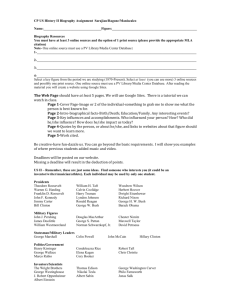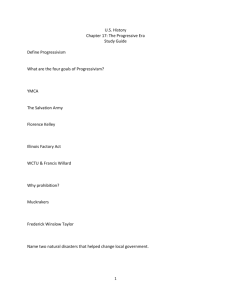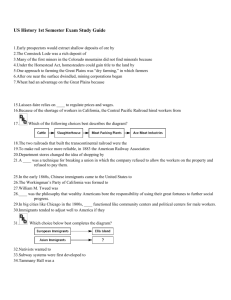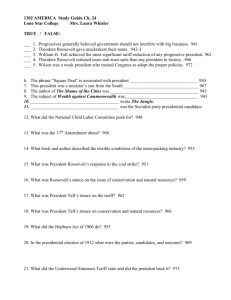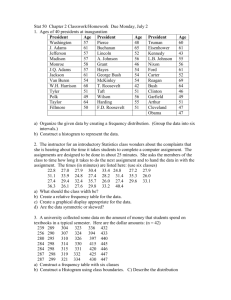Roosevelt & Taft
advertisement
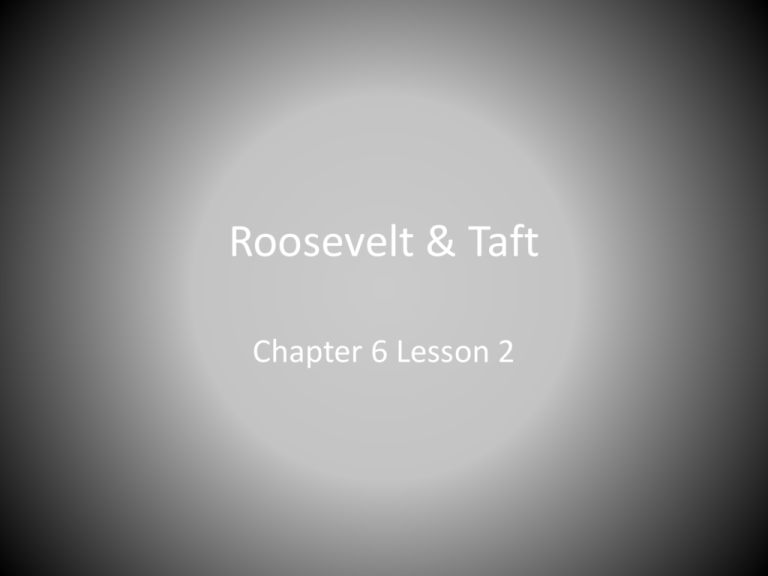
Roosevelt & Taft Chapter 6 Lesson 2 Theodore Roosevelt • President at age 42 • International affairs – Social Darwinism – Nations were in competition and only the strongest would survive • Domestically – Progressive – Gov. should balance the needs of competing groups Appling U.S. Constitution • Article I, Section 8, of the Constitution states that “The Congress shall have Power . . . To regulate Commerce with foreign Nations, and among the several States. . . .” U.S. v. E.C. Knight (1894) • Knight owned 98% of sugar industry • Sherman Anti-Trust Act could not be applied because the sugar was manufactured within a state Northern Securities v. United States • J.P. Morgan’s railroad holding company – Northern Securities • 1902 Roosevelt sued under the Sherman Antitrust Act – Restraint of Trade • 5-4 decision • Roosevelt won – hailed as “Trustbuster” Coal Strike of 1902 • 1902 – Mine Owners vs. 150,000 members of the United Mine Workers (UMW) • Wanted increased pay, reduced hours, union recognition • Arbitration – a settlement negotiated by an outside party – Mine owners refused until Roosevelt threatened to order the army to run the mines Department of Commerce and Labor (1903) • Roosevelt was not completely against all Trusts • Best way to keep trusts in line was to keep the public informed • 1904 – Investigating U.S. Steel – “Gentlemen’s agreement” – Open files for the DCL to look at – DCL would privately tell them the issues to fix them • Roosevelt will make this deal with other companies Hepburn Act - 1906 • Gave ICC power to set railroad rates • 1920’s ICC begun setting rates at levels intended to ensure the industry’s profits Samuel Hopkins Adams • • • • • Writer who exposed medicine business Cure many ills Alcohol, colored water, sugar Caffeine, opium, cocaine, etc. Dr. W. H. Wiley – Dept. of Ag. – Dangerous preservatives – formaldehyde and borax • Meat Inspection Act (1906) Today the USDA – Set standards of cleanliness in meatpacking plants • Pure Food and Drug Act (1906) Today the FDA – Prohibited the manufacture, sale or shipment of impure or falsely labeled food and drugs Roosevelt’s Conservation Acts • Newlands Reclamation Act (1902) – Dry Western States • Federal funs from public land sales to pay for irrigation and land development projects • US Forest Service – Regulate timber – 5 new National Parks and 51 fed. Wildlife reserves William Howard Taft • Roosevelt’s Secretary of War • Beat William Jennings Bryan (3rd straight loss) • Lower Tariff rates – Divided Republican party • Progressives – favored tariff reduction • Conservative – maintain high tariffs – Payne-Aldrich Tariff – hardly cut tariffs and raised them on certain goods Taft • 1909 – Replaced Secretary of the Interior (James R. Garfield) with Richard A. Ballinger • Garfield was aggressive conservationists • Ballinger was a conservative corporate lawyer • Ballinger tried to open a million acres of public land to private development • Gifford Pinchot (US Forrest Service) accused Ballinger of planning to give lands in Alaska for his own profit • Fired in 1910 for insubordination Taft • In 1910 Taft: • Set up the Bureau of Mines to monitor the activities of mining companies • Expanded national forests • Protect waterpower sites from private development Roosevelt vs. Taft • In 1907 Roosevelt approved the purchase of the Tennessee Coals and Iron Company by US. Steel • 1911 Taft declared that deal violated the Sherman Antitrust Act. • Roosevelt decided to run against Taft for Republican nominee in the 1912 elections
